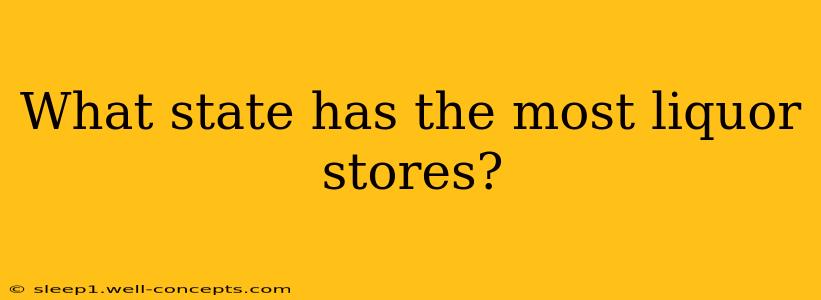Determining the state with the most liquor stores isn't as simple as looking at a single, readily available database. The number fluctuates based on licensing regulations, population density, and even recent legislative changes. However, we can examine factors that contribute to a high number of liquor stores and highlight the states most likely to hold the top spot. This isn't a definitive answer providing an exact number, as data collection across all 50 states presents a considerable challenge, but we can provide a strong educated guess.
Factors Influencing the Number of Liquor Stores
Several key factors play a crucial role in determining the number of liquor stores in a state:
-
State Alcohol Laws: States with less restrictive alcohol laws, allowing for more private liquor stores, tend to have a higher concentration than those with government-run monopolies or tightly controlled distribution systems. States with privatization often see increased competition, leading to a greater number of stores.
-
Population Density: Highly populated states naturally support more liquor stores due to increased consumer demand. Urban areas within these states typically boast a higher density of retail establishments, including liquor stores.
-
Tourism: States that heavily rely on tourism often have a higher number of liquor stores, catering to the needs of visitors. Tourist destinations often see higher-than-average alcohol consumption.
-
Per Capita Alcohol Consumption: While not directly correlated, states with higher per capita alcohol consumption might show a higher density of liquor stores to meet the increased demand. This is an indirect measure, however, and not the sole determining factor.
Contenders for the Title: The Likely Candidates
While a precise count is elusive, several states consistently emerge as strong contenders for having the most liquor stores:
-
California: With its massive population and diverse economy, California is a prime candidate. Its relatively lenient alcohol laws and high population density likely contribute to a significant number of liquor stores.
-
Texas: Similar to California, Texas boasts a vast population and a strong market for alcoholic beverages. Its size and diverse demographics likely support a significant number of retail liquor outlets.
-
Florida: A major tourist destination with a sizable population and relatively liberal alcohol laws, Florida frequently ranks high in alcohol sales and consequently might have a large number of liquor stores.
-
New York: Known for its bustling urban centers and high population density, New York also has a strong alcohol market and readily available liquor licenses.
The Challenge of Accurate Data Collection
The lack of a centralized, publicly accessible database that tracks liquor store numbers nationwide makes definitively answering this question extremely difficult. Data is often scattered across state-level agencies, and licensing information isn't always standardized or readily available online. This makes comparing states accurately a significant undertaking.
Conclusion: A Dynamic Landscape
The state with the most liquor stores is a dynamic figure, constantly shifting based on the factors discussed above. While California, Texas, Florida, and New York often rank high, further research at the state level would be necessary to make a conclusive statement. The key takeaway is that the number is influenced by a complex interplay of laws, population, and economic factors. This makes a straightforward answer elusive but highlights the robust nature of the alcohol retail market in several key US states.

